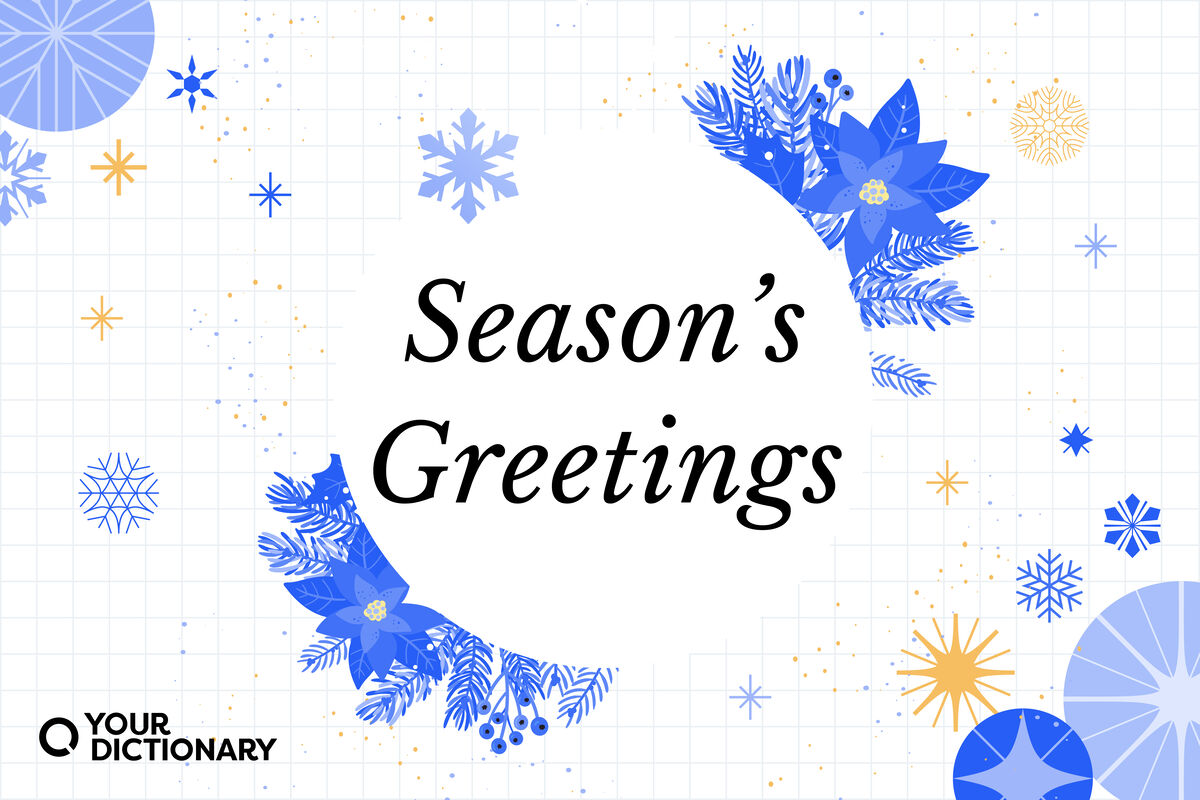
Holiday greetings help you know that it’s the jolly time where the weather is cold, the oven is preheated, and your family is ready to get on your nerves. While there are plenty of holiday greetings, one that stands the test of time is season’s greetings. Or is it seasons greetings? And how are you supposed to even say it to another person?
Which Is Correct: “Season’s Greetings” or “Seasons Greetings”?
Even among people who use season’s greetings as their go-to holiday greeting, it can be hard to figure out whether it’s season’s greetings or seasons greetings. Rest assured — the version with the apostrophe (season’s greetings) is the correct form.
Why? Well, that apostrophe indicates a singular possessive noun. The greetings in the phrase belong to the season (in this case, the winter holiday season). This helps to communicate that you are wishing happy thoughts and good vibes toward a person during the holiday season.
Without the apostrophe, seasons greetings imply a greeting related to all seasons — spring, summer, fall, and winter. That might not be unwelcome, but it’s definitely strange.
How and When To Use “Season’s Greetings”
Unless you’re making a joke, try to keep your season’s greetings to the winter holiday season. There aren’t any strict guidelines here, but you should be fine saying it around Thanksgiving and even a little after New Year’s Day.
Beyond that, you can be fairly free with your use of season’s greetings, as long as you’re not being too annoying about it. That includes:
- a salutation or sign-off in a greeting card, letter, or email
- part of a generic text message to your group chat
- in social media captions
- as a general greeting replacing or along with “Hello!”
"Season’s greetings" can be said as an exclamation on its own, or it can be used as part of a sentence like, “The Smiths extend season’s greetings to all of our friends and family and hope for a wonderful new year.”
"Season’s Greetings": What Does It Mean?
Season’s greetings is a broad, nondenominational greeting used during the winter holiday season. You’ll more often see season’s greetings written on a card, but people do say it to each other as a general show of positive cheer and well-wishes. Its usage is similar to happy holidays.
Where Did “Season’s Greetings” Come From?
No one knows for sure who said or wrote season’s greetings first. People may have been saying it regularly as far back as the mid-1800s, but it certainly became a standard part of advertising by the 1900s.
- Hallmark, the famous greeting card company founded in 1910, began producing cards in 1915, and its first line of Christmas cards included season’s greetings, along with Merry Christmas and other Christmas greetings.
- By the 1930s and 1940s, season’s greetings was a frequent staple of ads, though contrary to the non-denominational intent today, those old ads still heavily featured St. Nick, reindeer, and other Christmas iconography.
- In the 1950s, Dwight D. Eisenhower used season’s greetings in his holiday cards during his two terms as president. John F. Kennedy, Lyndon Johnson, and Bill Clinton, among others, also followed suit with non-denominational holiday greetings.
- Today, season’s greetings is regularly found in all types of media. In the modern day, K-pop groups send out merchandise packages called “Season’s Greetings” at the end of every year. These typically include exclusive stickers, planners, calendars, stationery, and DVDs.
Other Holiday Season Greetings
Happy Holidays
Happy holidays is the default non-denominational greeting for the season. Why single out any singular holiday when you can include all of them in one greeting? Despite what many believe, happy holidays has been around for decades. Some records show that the greeting goes as far back as the 1860s.
May Your Days Be Merry and Bright
Although this line originates from the classic song “White Christmas,” the meaning has become broad enough to entail general winter holiday cheer. Merry here refers to being cheerful and lively, while bright depicts the general warmth of being around the people you love.
Eat, Drink, and Be Merry
A general wish for hedonism and enjoying your life, eat, drink, and be merry is a nice casual saying that fits best before a meal or party. The full idiom is “eat, drink, and be merry, for tomorrow we may die,” but you can leave out that last part if you don’t want to remind people about the fleeting nature of life.
Although some people attribute the idiom to Shakespeare, it’s actually a combination of verses from the Bible. Still, even with the religious context, the phrase is broad enough to apply to anyone.
Invent Your Own Holiday Greetings
While you might not get a greeting as short as happy holidays or season’s greetings, you can still wish someone a happy winter season without ever even mentioning a holiday.
- Here’s to a joyful season!
- Wishing you plenty of pizza, cookies, and happiness in the coming season.
- I hope your new year is full of all your favorite things!
- May this holiday season be full of happiness, joy, and hot cocoa.
- Good health and happiness from our family to yours.